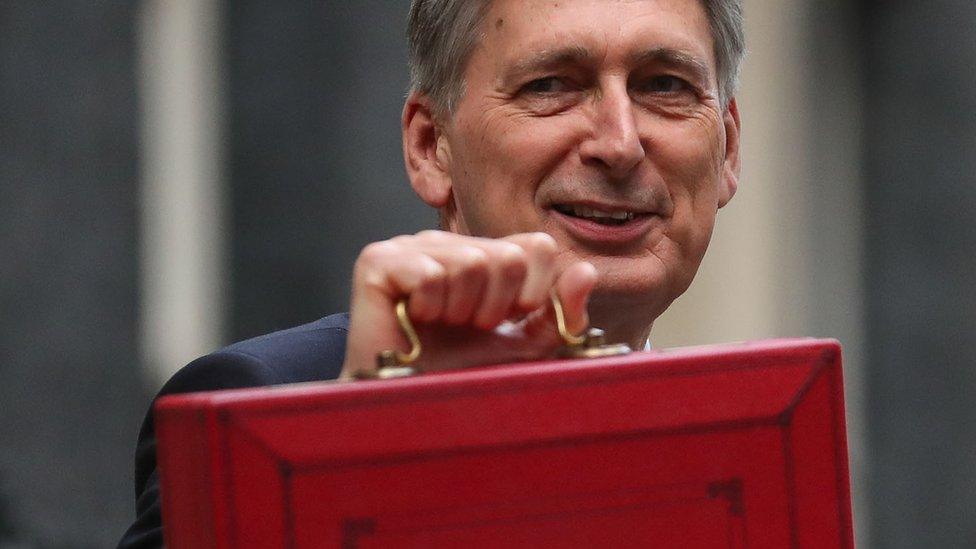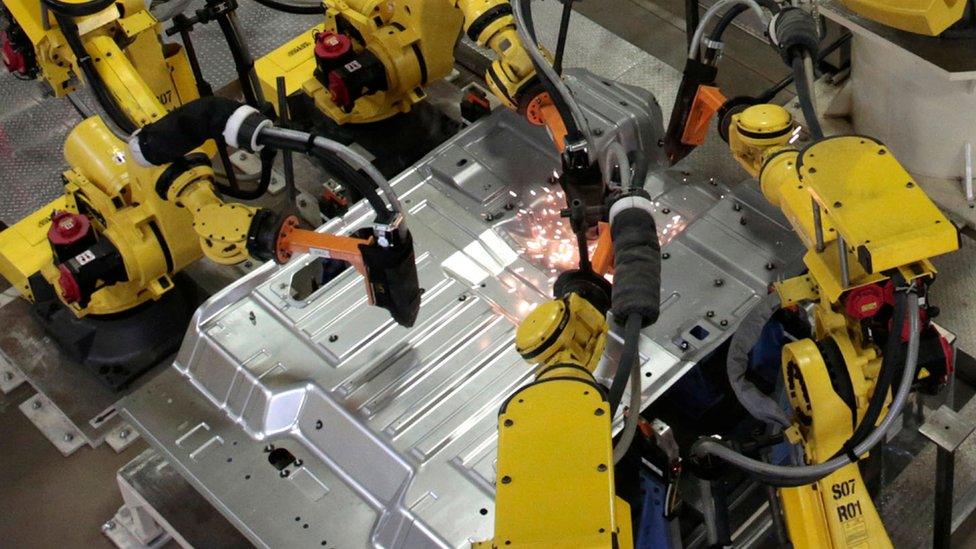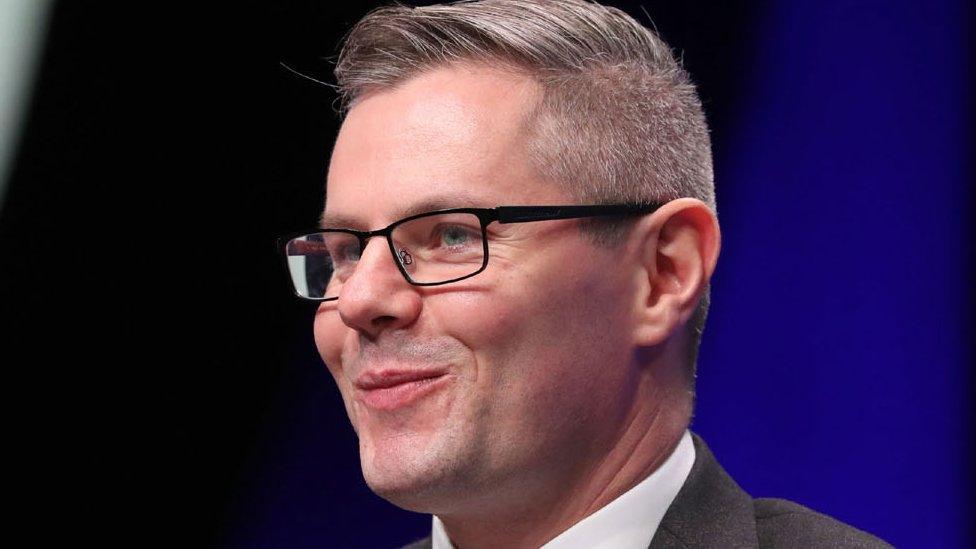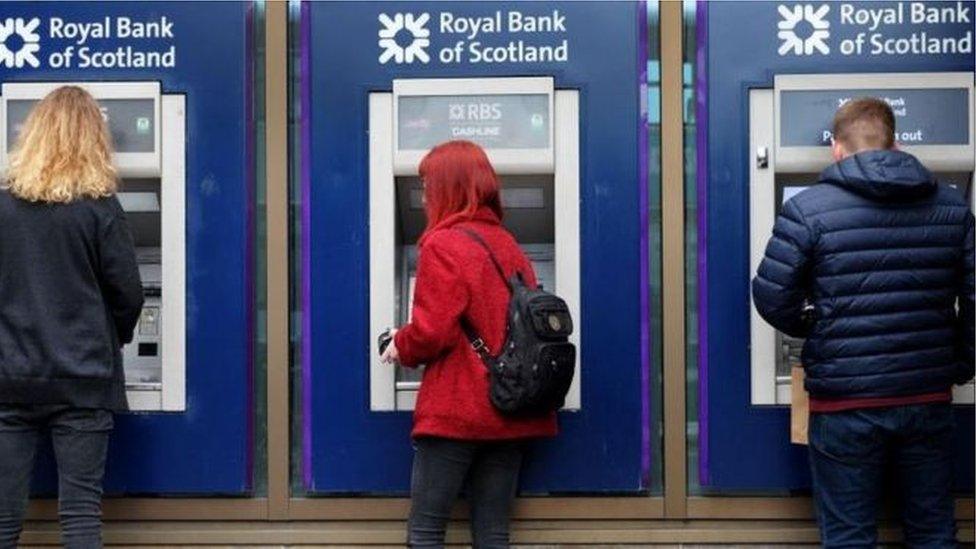Budget 2018: and now for Holyrood
- Published
The Conservative focus on getting Britain's finances out of the red has been pushed aside. Spending is now being used to help the country get through Brexit.
The consequences of Scotland include some tax changes for business, and in employment taxes.
The immediate question for Holyrood is how to spend £950m, and whether it will accelerate the divergence from the UK Treasury's income tax structure.

That Budget from Philip Hammond may leave you wondering what all that austerity fuss was about. Turning the deficit into a surplus was a sacred cause when George Osborne was Chancellor, and nothing would be allowed to stand in its way.
Well, OK, it didn't work out as planned. Cutting public spending may well have dampened economic growth, so the targets kept being moved.
The 2015 deadline was missed by a very wide margin. It was recently spotted somewhere around the middle of next decade, and receding over the horizon.
The Office for Budget Responsibility told the Chancellor that he could get into a surplus earlier than 2025 if he stuck to his plans and banked the unexpected tax revenues.
But he chose to have a bit of a splurge instead, turning on the spending taps a bit, with a crowd-pleasing £2.8bn tax cut by upping income tax thresholds.
It turns out that getting to a surplus doesn't matter all that much after all. The debt may be humongous, but if you don't borrow much, the impact of growth and inflation is to erode its scale over time. Measured as a share of national income, it may have peaked at 85.2% in 2016-17 and it's now falling.
Brexit battles
This changes the political landscape quite a lot. Putting aside the inevitable debates about "the end of austerity" (there's no agreed definition of austerity), Conservatives have become the party that thinks public spending can be good for you.
Fiscal conservatives aren't impressed. The Institute of Economic Affairs, which takes a largely disapproving view of tax and big government, reacted to the Budget with dismay that a Conservative government seems so relaxed that the tax burden is stuck around its current level, and debt remains so high.
So are fiscal hawks active in Westminster? Or are they all too busy fighting Brexit battles to risk a new front of attack against Downing Street?
Opposition parties sound a bit non-plussed by this twist in the narrative. This is not what they expected from a Tory Chancellor. But there's an opportunity. If Conservatives can now portray themselves as the party that's bringing an end to austerity, there are others who can do that with more conviction and enthusiasm, and also with a big borrowing and spending splurge.
Robot investment
What does it mean for Scotland? The bigger picture is a UK economy forecast to have very strong employment and low unemployment, but with very sluggish growth for at least five years, linked to poor productivity. Scotland shares those attributes and is affected by the rest of the UK, as its main "export" market.
That productivity might be given a lift if businesses can be persuaded to use that big lift, for two years, in the investment allowance. It's going up from £200,000 to £1m, to address one of the economy's weakest measures.

But pending clarity on Brexit, even a big lift in investment tax break is unlikely to unleash big spending on capital goods. And those that might fit the bill are the robots that could a) do a lot of damage to employment and/or b) replace absent EU workers.
The impact of changes to taxation of self-employed workers in the private sector will be felt on both sides of the border. So there are some tax changes that will be felt north of the border.
In oil and gas, "inviting evidence" of how Scotland can be turned into a hive of decommissioning activity sounds less than urgent for something that feels at least 10 years late. With £1.8bn to be spent annually in the next decade, and £50bn over the next 40 years, others are already winning that work, from Teesside to Norway and no doubt others will emerge at a greater distance.
Town centres
But the more immediate questions in Scotland start with: how to spend the £950m additional funding coming from Mr Hammond's Budget allocations? Finance Secretary Derek Mackay will set out his plans on 12 December.
He's already concerned that the long since pre-announced extra NHS funding is £50m less than expected, at £550m. That is near certain to go into health and social care. The politics of health demands it.

The next set of budget decisions will fall to Derek Mackay
Other funds result, for instance, from decisions to spend on the retail crisis afflicting city and town centres. Scotland has very similar problems. Mr Mackay doesn't have to spend on the same priorities as Mr Hammond, but with concerns about "high streets", he will need to have a compelling reason for not doing so.
Meanwhile, ministers reckon that other budgets in Whitehall have taken a cut, and these have also been passed on through the Barnett Formula block grant. Expect more detail on that when they've had time to analyse the newly-published numbers.
Tax competition
The other side of the ledger requires Derek Mackay to say how he responds to the unexpected changes to income tax band thresholds.
The rise in the starting threshold from £11,380 to £12,500 will apply throughout the UK, That will take more people out of paying tax altogether, and there's nothing Mr Mackay can do about it.
The higher rate of Westminster income tax, at 40p in the pound, will soon start at £50,000 of income. As things stand this fiscal year, Scottish income tax introduced a 41% tax rate at £43,430. With a five-band income tax structure to Westminster's three bands, Holyrood ministers are able both to ratchet up a more progressive tax system, and use increased complexity to obscure the extent of divergence.
Next year's income tax bill for someone earning £50,000 in England will be £7,500, excluding all sorts of allowances. If nothing were to change in Holyrood's tax rates and thresholds for 2018-19, someone earning the same in Scotland would be paying £8,927.
The difference is £1,427. If that Scottish threshold goes up with inflation, the difference would be closer to £1,100. And for every pound earned above £50,000, a Scot pays one more penny per pound in income tax than someone in England.
An additional complication is that for every pound earned between the Scottish higher rate, currently at £43,430, and Westminster's £50,000 threshold, there is a National Insurance charge of 12p. (NICs are all set at Westminster.)
Marginal rates of income tax-plus NICs in Scotland therefore rise to 53p in the pound for that tranche of earnings, and fall back to 43p for every pound above £50,000.
That's unlikely to persuade people they should move south of the border to pay less tax. But as a signal of divergence, and no word on where the divergence might end, it could have an impact on those thinking of a move to Scotland.
Without moving your home anywhere, income can be moved around, as explained by Moira Kelly, of the Chartered Institute of Taxation: "For those who are able to - such as self-employed business owners - this is likely to increase attractiveness of reorganising their tax arrangements to opt out of Scottish income tax and into UK-wide corporation tax in order to reduce their liabilities."
That's how taxes become uncompetitive, and how higher taxes can constrain growth. Mr Mackay will be weighing up those considerations ahead of 12 December. He will also have to weigh up what is required to get some opposition support to get his budget passed at Holyrood.
Watching brief
There were some brief asides in Philip Hammond's Budget speech that are worth keeping an eye on. One is the spending review, which he said will take place next year. He didn't have much detail on when, or over how long. Perhaps it is just that Brexit is making the Treasury cautious about committing itself to all the work involved.
The other is the question of social care. Whitehall is soon to set out its options. This is a very difficult but very important topic. It was mishandled spectacularly by Theresa May during last year's election campaign, sparking a political storm that looked to have knocked the issue into the long grass for many years to come.
But remember that the Institute of Fiscal Studies has been warning for some years that the "consolidation" of public finances we've been through in the past eight years, and which may now have been conveniently set to one side without reaching the advertised destination, is on the same scale as the consolidation that will be required to deal with demographic pressure on public services and welfare spending.
* An earlier version of this article had a lower figure for the gap between Westminster and Holyrood income tax bills for someone earning £50,000.
- Published26 October 2018
